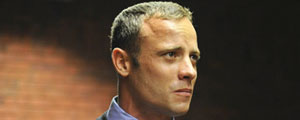
As a crime writer, I’ve thought a lot about murder.
Deon Meyer
Not just the technical or literary aspects, but also the seemingly insatiable public appetite for death. Why are we all so interested? Nowhere is this obsession more evident than in the trial of former Olympic athlete Oscar Pistorius for the murder of his girlfriend, Reeva Steenkamp.
Proceedings in the Pretoria courtroom over the past year have garnered more international attention than any other South African event in the social media age — even the funeral of our former president, Nelson Mandela.
Every day the foreign media have packed the court to churn out hundreds of stories to a hungry audience already watching the trial on television and following every new theory on twitter.
Part of this fascination can perhaps be explained by Pistorius’s particular history and background: he’s an international superstar, a role model and a global symbol of triumph over tragedy. But I believe it is wider than this.
I’ve always had my theories, some of which I’ve discussed with fellow crime authors. The simplified consensus seems to be that our fascination stems from the fact that (a) death is our ultimate fear and (b) we are driven by an inner need for justice in an unjust world.
But after witnessing the Pistorius spectacle I wanted to find out more. I contacted Professor Dap Louw, one of the world’s most experienced and respected forensic psychologists. Over more than three decades, he has interviewed scores of South African killers, testified in countless trials and written and taught on the subject extensively.
- Chamisa under fire over US$120K donation
- Mavhunga puts DeMbare into Chibuku quarterfinals
- Pension funds bet on Cabora Bassa oilfields
- Councils defy govt fire tender directive
Keep Reading
“The fixation with murder is real,” Louw says. “There’s been a plethora of students clamouring to study in the field. And I have to confess to the same obsession. After a lifetime in psychology, murder is the only field that continues to intrigue me. And the reason, I think, is human intellect. We are a physically puny species, compared with nature’s really dangerous predators. But evolution has developed our cognition into a lethal weapon, and honed our drive and skills to solve puzzles and problems. “Furthermore, we are social animals. We invest huge amounts of time, money and energy to fit in, and protect the stability of our society. Murder is the most violent and potent of society’s destabilisers. It presents a dangerous puzzle, and we study it constantly in an effort to find a solution.”
Evolution has turned the human brain into a pattern-finding machine, says Louw. Our study of murder becomes a quest to find environmental or behavioural patterns, so that we can predict who will kill, and who will not.
If we can identify a trend then somehow it is less random, and perhaps we will be personally less at risk? The Pistorius trial is a case in point. Observers have tried to suggest so-called gun culture was partly responsible for the death of Steenkamp. But if you study the statistics, South Africa does not really have such a thing.
What about a “Pistorius gun culture”? After all, in the mid-1970s Pistorius’s father allegedly shot himself in the testicles while in the company of his then girlfriend, the former Miss Universe Anneline Kriel.
Apparently Henke Pistorius was cleaning his pistol in front of Kriel when the accident happened. (He was not seriously injured.)
It has also been reported that the Pistorius family owned 55 firearms. Surely, growing up in this environment must have influenced the Paralympian on that fatal night?
“Perhaps,” says Louw. “But I’ve been talking to serial killers and murderers for 35 years and so many have one thing in common: they say: ‘I never thought I would be capable of such an act’. The more I study them, the more I am convinced that there is no reliable way to profile murderers. I think some human beings have a genetic predisposition to kill, and others do not. There is an X factor, a great unknown.
But I’m sure it is there, waiting to be discovered.
“Sure, a gun culture, or a traumatised youth, can contribute to pulling the X factor trigger. But I’ve seen it umpteen times — two kids can come from the same parents, grow up in the same conditions, but only one will have the capacity to kill.”
Whether or not he’s right, perhaps herein lies a clue to our fascination with murder trials and crime novels. As well as looking for patterns and wondering whether there is anything we can do to protect ourselves, are we wondering whether, in the right (wrong?) circumstances, we have it within us to kill ourselves?
Deon Meyer is a South African crime thriller writer whose books include Dead at Daybreak and Heart of the Hunter











